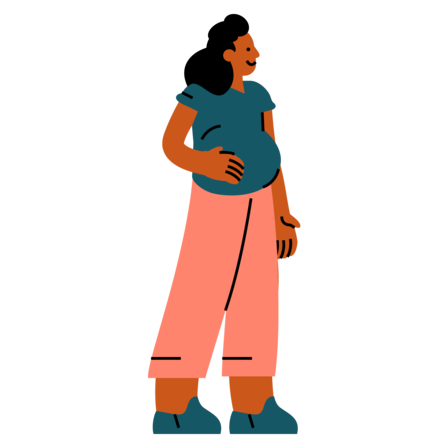Don’t have an account?
Select the donation type you’d like to make
Anaemia in pregnancy
Having a baby is a really exciting time, but it does place some extra demands on your body.
For starters, there’s an increase in the need for iron and it’s common for pregnant women to develop iron deficiency and anaemia. If it's found early enough it can usually be treated with iron supplements. Occasionally, you may need intravenous iron if you can’t absorb oral iron, have unmanageable side effects, or if you need to increase your iron levels quickly, like if your baby is due very soon.
Rarely, if iron deficiency and anaemia aren’t treated and become severe, a red cell transfusion may be needed to protect you and your baby.

Bleeding during pregnancy
Bleeding can happen throughout any stage of pregnancy. In early pregnancy, the main causes are ectopic pregnancy (when the egg implants itself outside of the womb), miscarriage, and diseases of the reproductive system. Although bleeding may be heavy, very few women will need a blood transfusion.
Later in pregnancy, the causes of significant bleeding include problems with the placenta and, rarely, rupture of the uterus (womb). Bleeding after childbirth is usually because the uterus hasn’t contracted properly following delivery. Other causes include trauma during delivery, and retained pieces of the placenta in the uterus. If the bleeding is severe, you may need a transfusion of red cells, platelets or plasma products.
Haemolytic disease of the newborn
If a baby is RhD positive and the mother is RhD negative, the mother may develop antibodies (attack molecules) to the baby’s red blood cells. In fact, the baby’s red blood cells may even be destroyed, which leads to anaemia. We call this haemolytic disease of the newborn. Fortunately, this deadly disease can be prevented by giving the mother an injection of a special blood product called Anti-D (RhD immunoglobulin) during pregnancy and after delivery.
Immune platelet disorders
Sometimes platelet antibodies are produced by the mother and cross over the placenta to destroy the baby’s platelets, which increases the risk of bleeding and complications. The mother is treated for this condition with intravenous immunoglobulin and the baby may require transfusions with specially typed platelets until delivery and in the first few days of life.

